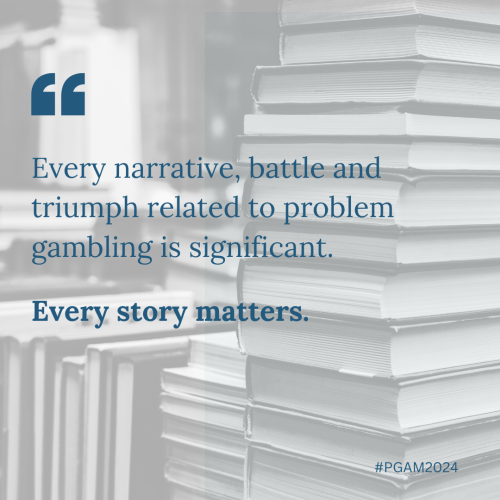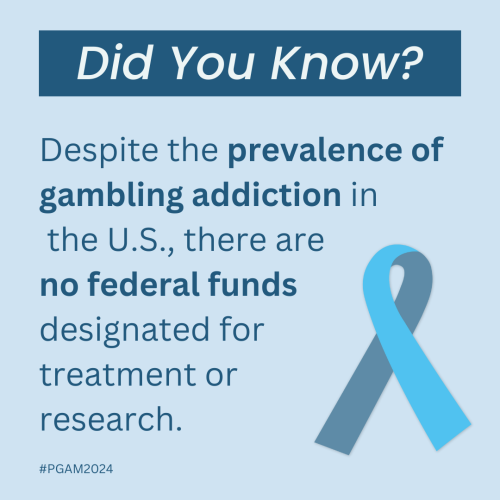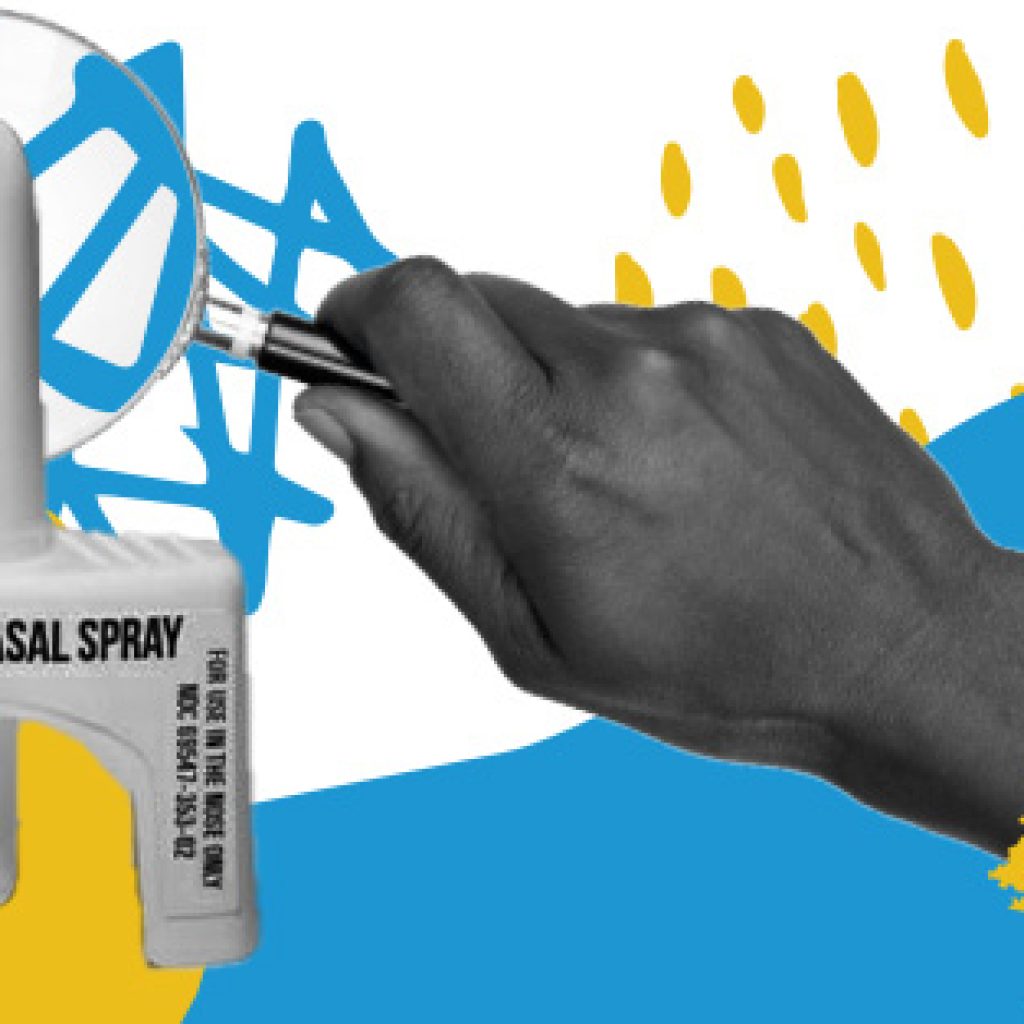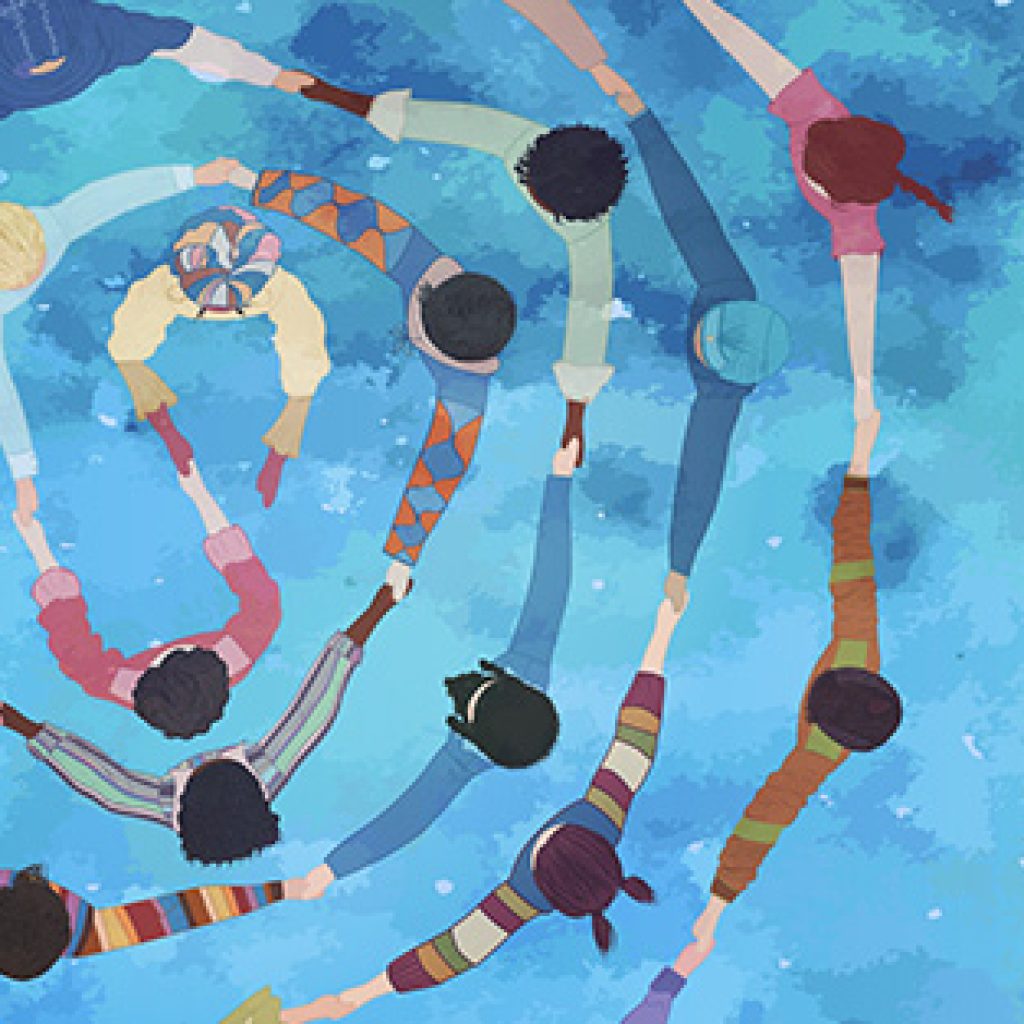Every Story Matters: Empowering Change During Problem Gambling Awareness Month
March is Problem Gambling Awareness Month (PGAM), a time to shed light on the impacts of gambling addiction, also known as gambling disorder. This mental health condition refers to gambling behavior that can have devastating effects on individuals and their families, disrupting their daily lives and careers. Recognized as a mental health diagnosis, problem gambling manifests through various warning signs. These include obsessive thoughts about gambling, increased wagering with the need to bet more frequently, chasing losses in attempts to recover lost money, feeling restless or irritable when trying to stop gambling, and persisting in gambling despite experiencing negative consequences. Left unchecked, problem gambling can escalate to severe consequences such as bankruptcy, legal issues, job loss, strained family relationships, and even thoughts of suicide. Awareness and understanding of these signs are vital in addressing the challenges of problem gambling and supporting those in need.
During March, the National Council on Problem Gambling (NCPG) leads the annual observance of Problem Gambling Awareness Month (PGAM). Visit their events calendar to find all of the events. Various resources are available for those interested in participating in Problem Gambling Awareness Month (PGAM). These include an advocacy toolkit containing templates for press releases, Tweets, logos, and graphics for online and print materials. Additionally, March 12th is designated as Gambling Disorder Screening Day. Any provider or organization can host this important day and use these free resources. Professionals in behavioral health and others can find numerous reasons and ways to combine awareness + Action throughout March and beyond.

This year’s theme for Problem Gambling Awareness Month, “Every Story Matters,” serves as a poignant reminder of the significance of every narrative, battle, and triumph related to problem gambling. Throughout the month-long campaign, we are encouraged to elevate these stories, fostering understanding and support within our communities. The two primary goals of this national campaign are to increase public awareness of problem gambling and the availability of prevention, treatment, and recovery services and to encourage healthcare providers to screen clients for problem gambling. By working together to achieve these objectives, we can make a meaningful difference in the lives of those affected by problem gambling and create a more supportive and inclusive environment for all. Let’s amplify awareness, break down stigmas, and emphasize that when it comes to problem gambling, Every Story Matters. If you have a story you would like to share, please email us at ondemand@casat.org.
Problem gambling is a significant issue across the United States, with statistics highlighting its prevalence. Annually, around 2.5 million U.S. adults, constituting 1% of the population, meet the criteria for severe gambling problems. Additionally, a further 5-8 million individuals, comprising 2-3% of adults, meet one or more criteria for gambling disorder and face challenges due to their gambling behavior. The National Council on Problem Gambling estimates that problem gambling exacts a substantial social cost, totaling $14 billion annually. This encompasses a range of consequences, including job loss, bankruptcy, and healthcare spending associated with gambling-related issues. These figures underscore the urgent need for increased awareness, support, and resources to address the widespread impact of problem gambling on individuals and society.

Taking action beyond raising awareness is essential in addressing problem gambling. Whether you’re looking to enhance your professional knowledge, commit to screening clients, or acknowledge colleagues working with gambling addiction, there are tangible steps you can take. To aid professionals in taking action, here are some tips for keeping gambling disorder in mind across various aspects of behavioral health practice.
Here are some actionable tips for professionals to address gambling disorder within their behavioral health practice:
- Broaden Your Understanding: Recognize that gambling disorder encompasses more than just traditional forms of gambling like casinos. It includes activities such as bingo, lottery tickets, and stock market trading.
- Regular Screening: Make it a routine to screen clients for gambling disorder, as it may not be evident until later stages of recovery from other behavioral health disorders. Utilize recommended screening tools such as the Brief Biosocial Gambling Screen (BBGS) or DSM-5 criteria to facilitate early identification.
- Advocate for Support: Take an active role in advocating for programs and services that support individuals with gambling disorder and their loved ones. Consider joining organizations like the National Council on Problem Gambling (NCPG) or participating in events like Problem Gambling Advocacy Day.
- Educate Clients and Others: Share information and resources about problem gambling with your clients and within your professional network. This could involve providing educational materials or connecting individuals with relevant support services.
By incorporating these proactive steps into your practice, you can play a significant role in combating problem gambling and providing support to those affected by it. In addition, we encourage to continue to learn through professional development opportunities. Below are several ways you can learn more!
This month, CASAT Learning is offering Screening for Gambling Problems: Why Addressing Client Gambling Behaviors Matters in Behavioral Health Care: SELF-PACED ONLINE free in honor of Problem Gambling Awareness Month. Perhaps you are not yet a behavioral health provider, or you know someone interested in becoming a Problem Gambling Peer Support Specialist. CASAT Learning also offers Problem Gambling Intern Readiness: Self-Paced Online course.
For a comprehensive look at this public health crisis, read the article, Problem Gambling: A Public Health Crisis. To read all of the posts about Gambling Disorder, visit the Gambling Disorder category of the Catalyst blog. For additional resources and links on Gambling Disorder, visit the Resources & Downloads page of the CASAT OnDemand website.
Problem Gambling Support & Resources
For individuals or their loved ones seeking help with problem gambling, there are resources available: National Problem Gambling Helpline: The helpline (1-800-GAMBLER) offers support via call, text, or chat. It provides detailed information about treatment resources available in your area.
- Call: 1-800-GAMBLER
- Text: 800GAM
- Chat: 1800gamblerchat.org
In conclusion, Problem Gambling Awareness Month serves as a crucial reminder of the pervasive impact of gambling disorder and the importance of proactive measures in addressing it. By understanding the signs of problem gambling, taking action through screening, advocacy, and education, and accessing available support and resources, individuals can embark on a path toward regaining control and enhancing their overall well-being. If you or someone you know is grappling with problem gambling, don’t hesitate to seek assistance from the National Problem Gambling Helpline or a behavioral health professional. Together, let’s continue to raise awareness, break down stigmas, and emphasize the significance of every story in the journey towards recovery and resilience.
How will you or your organization be observing Problem Gambling Awareness Month? Are you registered on the PGAM website to let people know? Post in the comments below!
References:
National Council on Problem Gambling. (2024). Problem Gambling Awareness Month (PGAM). Retrieved from https://www.ncpgambling.org/ncpg/
Blog Post Tags:
Related Blog Posts
Related Learning Labs
Related Resources
.
- Buscar Tratamiento de Calidad para Trastornos de uso de Sustancia (Finding Quality Treatment for Substance Use Disorders Spanish Version)
- Finding Quality Treatment for Substance Use Disorders
- Focus On Prevention: Strategies and Programs to Prevent Substance Use
- Monthly Variation in Substance Use Initiation Among Full-Time College Students
- The National Survey on Drug Use and Health (NSDUH) Report: Monthly Variation in Substance Use Initiation Among Adolescents









Gambled for at least 25 years and I can tell you that it’s my worst decision but still the biggest moments I’m grateful for. I learnt so much, although the hard way but at least it taught me a lot about myself. And the negative experiences I got from gambling taught me how to better control my excitement and myself better in the future. You have to love yourself along with all your flaws. As for your lost money, you can retrieve that, just reach out to globalhackrevolutiongmailcom. Mine was successfully retrieved. They are 100% authentic.